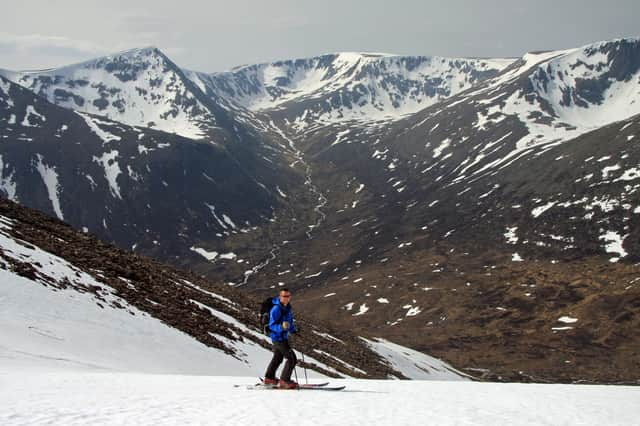Why Scottish skiers should take note of US avalanche data


It's easy to mock the American habit of reducing sports to numbers – batting averages in baseball, pass completion averages in American football – why can't they just relax and have fun? Every now and then, though, the rest of the world gets to learn something useful from the Yankee fixation with stats. Exhibit A: a study recently published by researchers at the Colorado Avalanche Information Center (CAIC), based on information they gathered during the 2020-21 ski season.
Sensing that there had perhaps been an uptick in the number of avalanche accidents after the coronavirus pandemic took hold, the center’s director Ethan Greene set out to discover if his hunch was right, and, if it was, to try and understand what had caused the increase.
Advertisement
Hide AdAdvertisement
Hide AdTravel restrictions and resort shutdowns in Colorado came into force on 13 March, so Greene and the CAIC's lead scientist Spencer Logan divided the season's avalanche incidents into those that took place before that date and those that took place after it, and then analysed the differences between them. The results of their research were striking, and they have implications for backcountry skiers and snowboarders all around the world, including here in Scotland.
There were 86 documented avalanche accidents in Colorado’s 2019–20 season involving 126 people, six of whom died. Of these, 55 incidents were recorded before 13 March and 31 after, but 13 March is by no means the mid-point of the ski season. There are roughly four months of skiing from mid-November to mid-March, then about two and a half months after that, so Greene's initial hunch was wrong: on average there were 13.75 incidents per month before 13 March, but slightly fewer – 12.4 per month – after that date.
Never mind the headline figure, though, because things only really started to get interesting when Greene and Logan began drilling down into their results. All those caught in Colorado avalanches last season were given a score based on their level of avalanche awareness, ranging from "none" for those who had no idea whatsoever about backcountry travel, through beginner, intermediate, advanced and expert to "authority," for high-level professionals.
The first thing Greene and Logan noticed was that the majority of those involved in avalanches had intermediate or advanced skill levels. This wasn't a big surprise, as previous studies had shown that as training and experience increase, so does time spent in avalanche terrain. What came as a shock, however, was a “significant change” in the experience level of those involved in avalanches at the tail end of the season, with "advanced" backcountry travellers becoming more likely to be caught in an avalanche after 13 March.
"We don’t know why this occurred," they write, "but there’s some anecdotal evidence that may help explain the shift. As recreation increased after pandemic closures of ski areas, easily-accessible areas became crowded and tracked up. More skilled recreators used those skills to push into less familiar terrain or explore new areas... Some observers reported an 'increase in risky behavior' or people 'taking more avalanche risks.'"
At time of writing, trying to predict what form the 2020-21 ski season will take here in Scotland is impossible: who knows how long the resorts will be able to stay open, or whether skiers from other areas of Scotland or the UK will be permitted to travel to them. One thing that does seem fairly certain, though, is that a significant number of people who would normally visit a ski resort will probably decide to go backcountry skiing instead, and when that happens we may well see "easily-accessible areas" become "crowded and tracked up" causing the more experienced to "push into less familiar terrain."
It's all-too-easy to imagine the scenario: a couple of veteran ski tourers pull up at the bottom of their favourite hill just before dawn, expecting to find the car park all-but deserted, but instead, to their horror, it's already heaving, and little clusters of headtorches can already be seen half-way up the mountain face they were hoping to ski. Suddenly, the maps come out and the plan changes: "If we head over here instead we'll get away from the crowds." "What's it like?" "No idea, but it'll beat skiing here with the rest of the circus."
The best advice for first-time backcountry adventurers at this time of year is the same as it's always been: take an avalanche awareness course, make sure you have the holy trinity of transceiver, probe and shovel, and make sure you know how to use them. In light of Greene and Logan's research, though, perhaps it's worth adding a couple of words for the more experienced: even if the hill's looking more crowded than you'd hoped, maybe just stick to your original plan for the day. Skiing second-hand snow might not be as much fun as skiing pristine powder, but it's a whole lot better than never getting to ski again.
A message from the Editor:
Advertisement
Hide AdAdvertisement
Hide AdThank you for reading this story on our website. While I have your attention, I also have an important request to make of you.
The dramatic events of 2020 are having a major impact on many of our advertisers - and consequently the revenue we receive. We are now more reliant than ever on you taking out a digital subscription to support our journalism.
To subscribe to scotsman.com and enjoy unlimited access to Scottish news and information online and on our app, visit https://www.scotsman.com/subscriptions
Joy Yates, Editorial Director